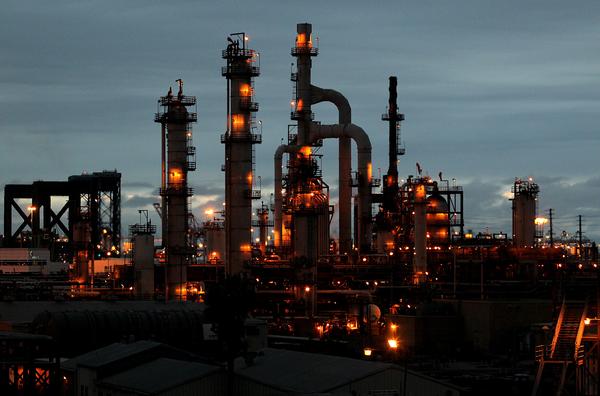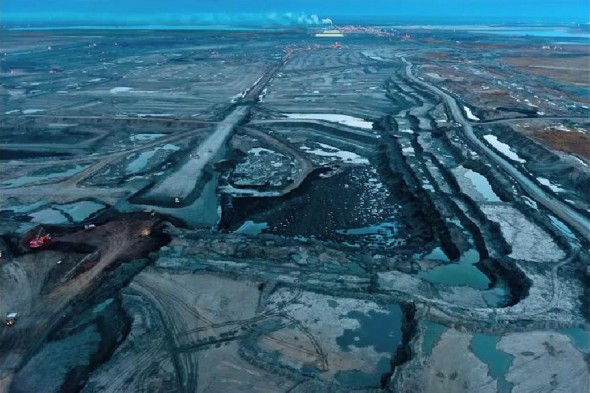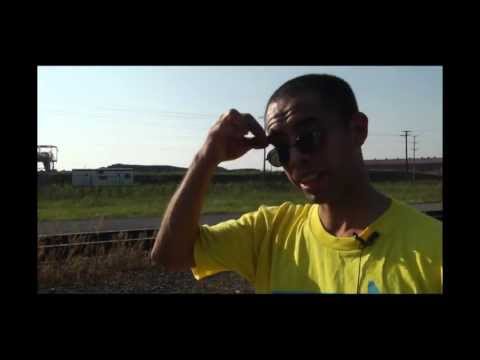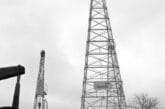Valero Energy sought permits last year for large-scale shipments of low-quality tar sands oil via rail into their Port of Los Angeles refinery. They have since backed off the project, but the threat remains. As part of a larger move to transport climate-disrupting unconventional crude to ports for refining and export to the world, it presents dangers given recent rail accidents, the corrosive nature of tar sands bitumen, and the significant pollution that surrounding communities already live with.


Groups Call on Valero for Transparency and Public Comment in Tar Sands By Rail Project
Valero Energy Corp intends to construct a 50-car rail unloading system to import 60,000 barrels of tar sands diluted bitumen (dilbit) per day into their Ultramar Wilmington Refinery in the Harbor Area of LA. This proposal would potentially exchange more than 76% of its refinery input from conventional crude to dilbit. A coalition of climate, environmental and social justice activists led by Tar Sands Action SoCal, has demanded that AQMD conduct an open and transparent process on the Valero project, with public participation in an environmental review process. See the petition: http://www.credomobilize.com/p/TSWilmington
Report on the Nov 1 SCAQMD Hearing From Sherry Lear, Activist and Attorney with Sierra Club Beyond Coal and SoCal 350: “The good news is due to the significant interest generated from our campaign, the AQMD will REQUIRE a public comment period as well as a public hearing on the matter. So that was definite progress. That being said, some of the AQMD staff are still discounting the fact that refining tar sands produces much higher carbon emissions than refining other types of “crude” and also produces much great amounts of petroleum coke waste. In addition, some of the public speakers addressed the issue of the transporting tar sands by rail, which has already proven very dangerous. We still need to address the issue on whether the City of LA or AQMD should be the lead agency.”
The Natural Resources Defense Council (NRDC) and Communities for a Better Environment requested in April 2013 an inquiry as to the impacts from refineries already processing the semi-solid form of oil have increased their noxious emissions and raised risks of accidental spills and accidents. They called upon the South Coast Air Quality Management District (AQMD) to evaluate the effects on health, air quality, safety and the climate of refining the heavy Canadian crude, which requires intensive processing to remove higher levels of sulfur to meet U.S. standards. Now that the application has been released [albeit redacted to protect their “trade secrets”], the community must be brought to the table.
httpvh://youtu.be/lScsUhZ1VrU
Ecosocialist Conference LA 2013 – Scraping the Bottom of the Barrel – Tar Sands and Fracking. Jack Eidt speaking on Tar Sands at about 9:00.
Impacts of Transporting, Refining and Burning Tar Sands
This local battle is part of the larger campaign against heavy Canadian crude that has stalled the Keystone XL pipeline project, which would carry tar sands oil to the Gulf of Mexico. In fact, the delays in approvals of the KXL, based on the unprecedented protest against this form of climate-disrupting and ecosystem-threatening unconventional fossil fuel, has led the oil industry to explore numerous avenues to bringing their toxic product to market.


Accidents. Given the highly corrosive nature of sulfur-rich bitumen, accidents have become more common. The dangers of hauling a toxic and flammable product through winding mountain passes compounds the dangers. Consider the horrific explosion of an oil train in Canada’s Lac-Megantic, Quebec, where 42 people were killed. In March 2013, a train derailed in Minnesota, spilling 15,000 gallons of Canadian tar sands crude. What about last year’s pipe failure in at the Chevron Richmond Refinery that sent more than 15,000 local residents to area hospitals. Significantly increasing supplies into the refinery could make corrosion-related accidents more likely and pose a unique set of pollution and safety related risks to both local communities and refinery workers.
Air Quality. Los Angeles communities experience higher rates of asthma, because they breathe some of the most polluted air in the country. Of particular concern is the low-income community of Wilmington, an LA Harbor suburb surrounded by five oil refineries and long decried by social justice groups as a “sacrifice zone” of commerce and toxic pollution. Many studies have found that refining dilbit releases into the air greater concentrations of pollutants such as sulfur dioxide, various heavy metals, and other harmful pollutants.
The main danger is that tar sands refineries emit significantly higher amounts of sulfur dioxide, which is linked to wheezing, chest tightness, overall reduced lung function, cardiovascular issues, and respiratory weakness. Sulfur dioxide is especially dangerous for people who have preexisting heart and lung conditions. — ForestEthics
In addition to Valero, Phillips 66 Co. and Tesoro Corp also have announced plans to use rail cars to bring in more Canadian tar sands, with as yet no public process to evaluate the impacts of this move.
Climate Disruption. Refining and burning tar sands also produces more greenhouse gases than liquid crude, and will have implications in further destabilizing the climate. As former NASA scientist Dr. James Hansen famously stated, the planned quadrupling of tar sands oil extraction in Canada would mean “game over for the climate.” Moreover, regional increases in carbon pollution will make it harder for Southern California to meet requirements of the state’s global warming law, AB 32, which seeks to reduce emission levels by creating a market that puts a price on greenhouse gas emissions. Owners of power plants and factories buy and sell permits to release the gases into the atmosphere, but oil companies are not required to announce the sources of their crude.
Petcoke. The coal-like waste product produced in high volumes from tar sands refining, petroleum coke causes significant issues with toxic dust for already environmentally-compromised communities. The issue of petcoke hit the national media spotlight when piles appeared along the Detroit River after a similar expansion of tar sands refining began at the nearby Marathon refinery. BP’s Whiting refinery produces 6,000 tons per day, which is being dumped in massive piles near homes on Chicago’s southeast side. Moreover, new regulatory documents point to similar issues in Lima and Toledo, Ohio (the Detroit piles ended up somewhere in Ohio…nobody is saying exactly where).
Petcoke can be used as a cheap fuel for coal-fired power plants, yet it releases 53.6 percent more CO2. “Petcoke is the coal hiding in the tar sands,” said Lorne Stockman, research director for Oil Change International.

Watch this video on YouTube
NRDC: Piles of Petcoke and Coal Worry Residents in Southeast Chicago
Environmental Review with Full Disclosure and Public Participation
Any proposed changes to the refineries that could significantly increase pollution should be evaluated carefully through an open process that encourages public participation.
The Air District has the authority to conduct a public comment period on permits that could result in significantly higher levels of air pollution. Tar Sands Action SoCal and their coalition encourage the district to do the following:
1. Release all relevant information related to the project for public review.
2. Conduct an open and transparent California (CEQA) evaluation process including an Environmental Impact Report with public comments on the proposed crude-by-rail facility, and
3. Increase public participation by widely publicizing the public comment period.
While AQMD has been chosen as the lead agency, we would prefer the City of Los Angeles take over and accelerate the process for doing a publicly transparent California Environmental Quality Act impact analysis, despite Valero’s payment of a 50 percent surcharge for an expedited review.
No Public Input. To date, there has been no public input in the process. Valero’s application indicates a request to start construction by February 1, 2014. Valero indicated on their application that their maximum throughput, refinery equipment, and energy demand would not change from the proposed project. Furthermore, they claim no increase in combustion emissions, which emit less than 30 pounds of volatile organic compounds per day. Yet, these claims must be evaluated through objective study. Yet, Valero has maintained that all other correspondence, supplemental reports and documentation, and other information vital for analysis of potential impacts of the facility, should remain confidential.
It is imperative that the public be allowed to evaluate this project’s effects on health, air quality, safety and the climate. As our coalition has delivered the petition to AQMD, which includes a letter signed by a coalition of national, regional, and local environmental and community organizations, we await the public process to get underway early next year.













Pingback: Tar Sands
Pingback: Great March for Climate Action: Kick-Off in LA - March 1st | WilderUtopia.com
Pingback: Coast-to-Coast Climate March: Why Launch from LA Harbor? | WilderUtopia.com
Pingback: Coast-to-Coast Climate March
Pingback: Climate Action March
Pingback: Tar Sands Oil "Bomb" Trains Proposed for California | WilderUtopia.com
Pingback: Stop the Madness: On Overcoming Bomb Trains and Sacrifice Zones in LA and Beyond - LA Progressive
Pingback: Nationwide Coast-to-Coast Climate March: Why Launch from Wilmington? – Wilmington Wire